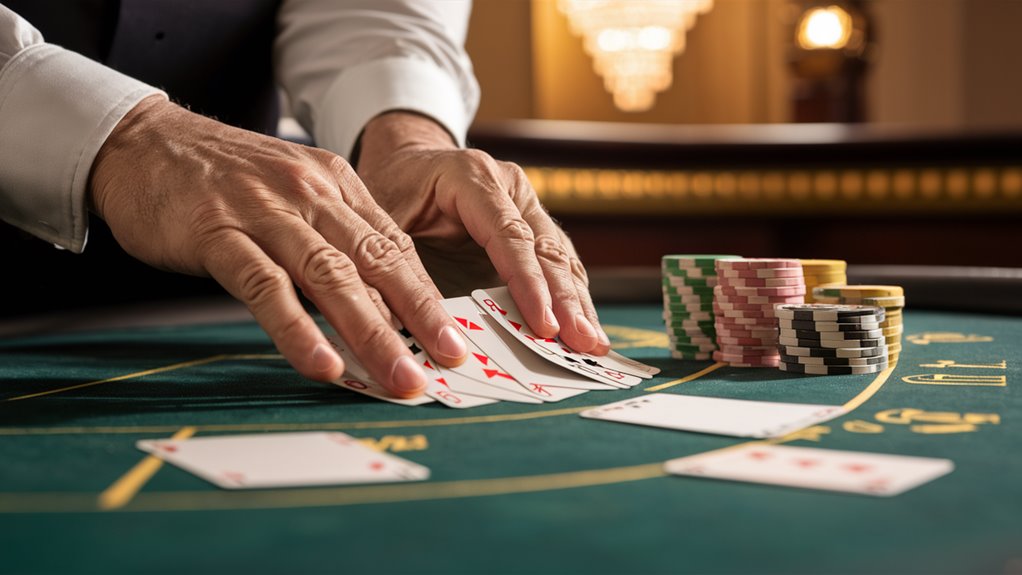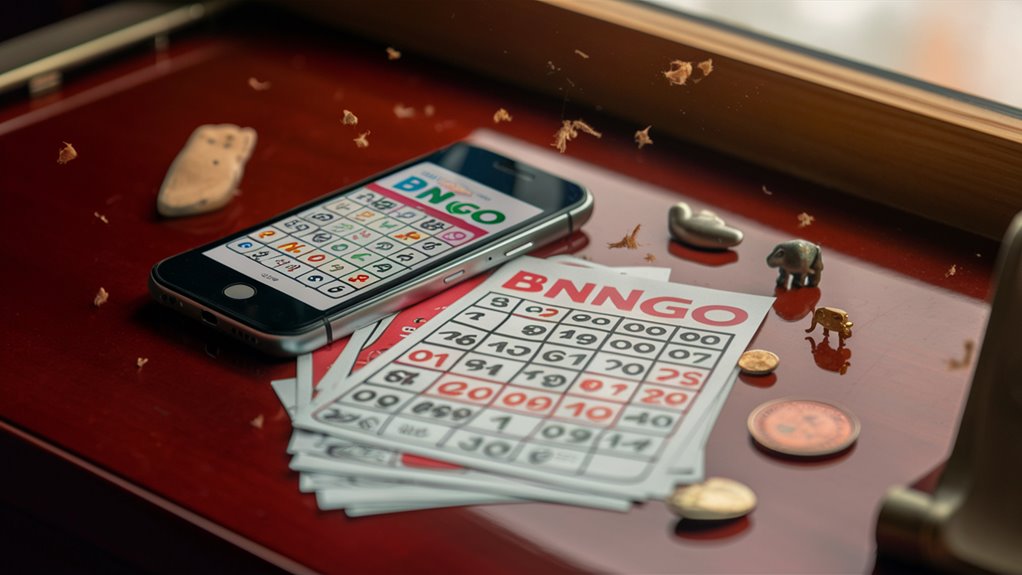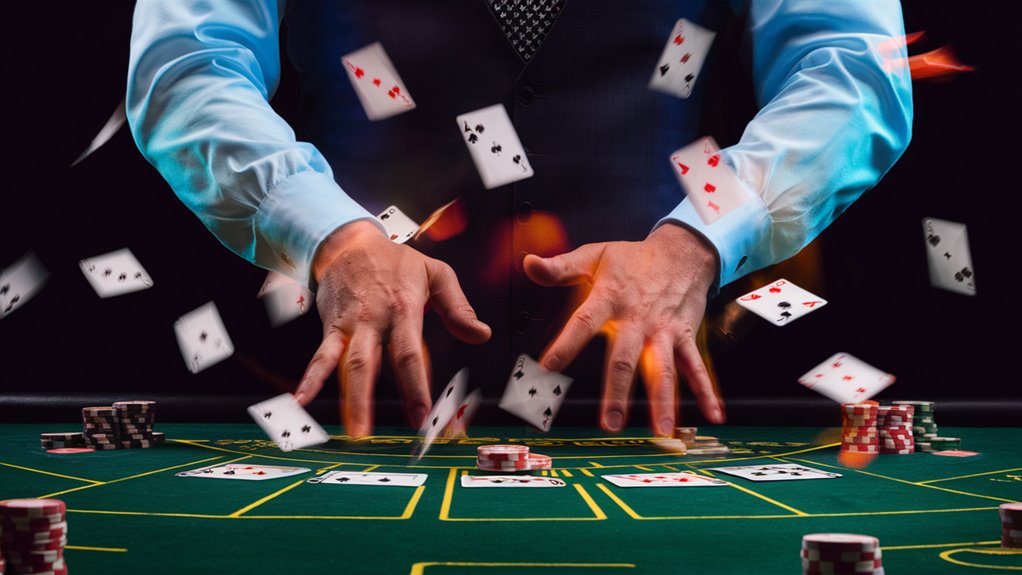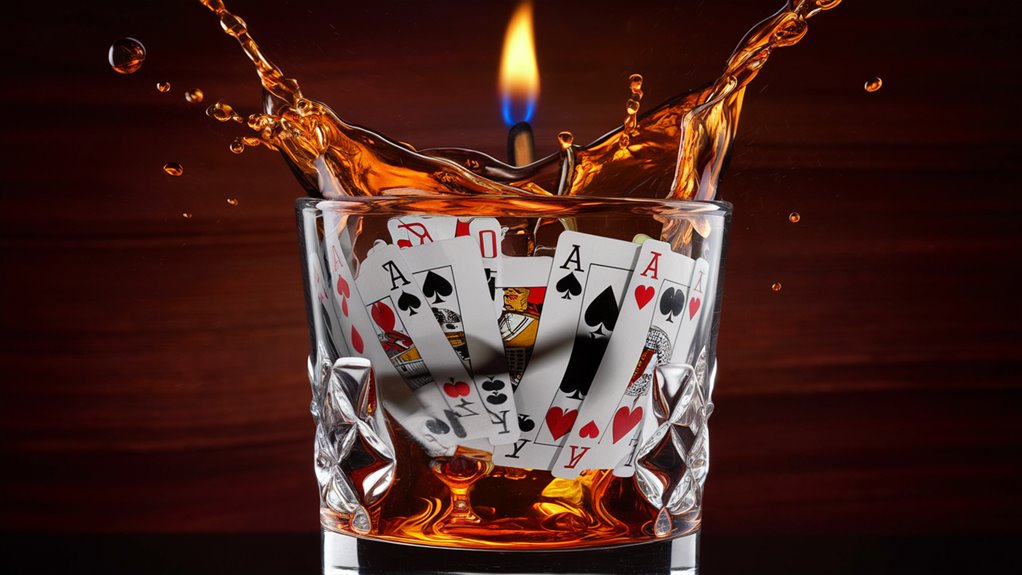From Beginner to Boss: Leveling Up Your Casino Skills
The journey from casino novice to skilled player requires mastering a sophisticated blend of strategic gameplay, psychological awareness, and bankroll management. Through extensive experience observing player development, I’ve identified the core elements that transform recreational gamblers into consistent winners.
Mastering Core Casino Fundamentals
Professional-level casino play demands more than understanding basic rules and odds. Successful players develop:
- Advanced mathematical comprehension of probability and expected value
- Strategic decision-making skills under pressure
- Precise bankroll management techniques
- Mental discipline and emotional control
- Table presence and professional etiquette
Advanced Strategy Implementation
To elevate beyond basic gameplay, focus on:
- Pattern recognition in game outcomes and player behavior
- Risk assessment and position play
- Optimal bet sizing based on bankroll and table conditions
- Advanced card counting techniques for applicable games
- Tell identification and psychological warfare
Bankroll Management Excellence
Professional money management encompasses:
- Strategic bankroll allocation across different games
- Stop-loss discipline implementation
- Profit-taking protocols
- Risk-reward ratio optimization
- Long-term sustainability planning
Frequently Asked Questions
Q: How long does it take to become proficient at casino games?
A: Achieving proficiency typically requires 6-12 months of dedicated study and practice for a single game specialization.
Q: What’s the most important skill for casino success?
A: Bankroll management consistently ranks as the most critical skill, superseding even technical game knowledge.
Q: Should beginners focus on multiple games or specialize?
A: Initial focus on mastering one game provides better results than dividing attention across multiple games.
Q: What’s the optimal starting bankroll for serious players?
A: A minimum of 50 times your average bet size is recommended for adequate bankroll protection.
Q: How important is emotional control in casino success?
A: Emotional control is fundamental, as it directly impacts decision-making quality and long-term profitability.
Understanding Basic Casino Etiquette

Essential Casino Etiquette: A Comprehensive Guide
Table Manners and Gaming Protocol
Casino etiquette forms the foundation of a successful and enjoyable gaming experience.
Gaming floor conduct ensures smooth gameplay while maintaining respect for fellow players and staff.
When approaching any gaming table, wait for the current hand or round to conclude before taking a seat.
Table game protocol requires players to refrain from handling chips or cards until the dealer signals the start of play.
Mobile devices and photography equipment must remain stored away, as most establishments enforce strict policies against their use.
Tipping and Chip Management
Dealer gratuities represent a crucial aspect of casino culture. Professional players typically employ two primary tipping methods:
- Placing dealer bets during gameplay
- Offering a percentage of substantial wins
Proper chip handling involves maintaining neat, organized stacks and keeping all gaming materials within the designated table area.
Cards must never leave the playing surface, ensuring game integrity and compliance with casino regulations.
Player Interaction and Conduct
Gaming etiquette dictates maintaining professional composure during both wins and losses.
Refrain from offering unsolicited advice or commenting on other players’ decisions.
Responsible alcohol consumption ensures clear judgment and appropriate behavior throughout gaming sessions.
Frequently Asked Questions
Q: What’s proper casino dress code?
A: Most casinos require smart casual attire, prohibiting beachwear, athletic gear, and overly casual clothing.
Q: How should I join a table game in progress?
A: Wait for a natural break between hands and signal the dealer for permission to join.
Q: When is the appropriate time to tip dealers?
A: Regular tipping during winning sessions is customary, particularly after significant wins.
Q: Are mobile phones allowed at gaming tables?
A: Most casinos prohibit mobile phone use at gaming tables to prevent cheating and maintain game integrity.
Q: How should I handle confusion about game rules?
A: Ask dealers for clarification immediately; they prefer addressing questions proactively rather than correcting mistakes.
Building Your Bankroll Strategy

Building a Professional Bankroll Management Strategy
Essential Bankroll Management Principles
Effective bankroll management forms the cornerstone of successful gambling strategy.
A well-structured approach not only maximizes playing time but also safeguards financial stability during casino sessions.
Setting Strategic Limits
Bankroll allocation requires implementing strict monetary boundaries:
- Total bankroll division: Allocate no more than 10% of total funds per session
- Session management: For a $1,000 bankroll, maintain $100 session limits
- Risk mitigation: Separate gambling funds from essential accounts
Win Goals and Loss Thresholds
Implement precise exit strategies through:
- Win ceiling: Target 50% profit on session bankroll
- Loss floor: Cap losses at 50-75% of session funds
- Systematic tracking: Monitor all wagers meticulously
Advanced Bankroll Protection Measures
Financial segregation proves crucial for responsible gambling:
- Maintain dedicated gambling accounts
- Establish separate wallets for casino funds
- Never compromise essential financial obligations
Frequently Asked Questions
Q: What’s the optimal bankroll percentage for single sessions?
A: Limit single session exposure to 10% of total bankroll.
Q: How should I determine my win goals?
A: Set win targets at 50% of session bankroll.
Q: When should I stop playing during a session?
A: Exit upon reaching predetermined win goals or loss limits.
Q: Can I borrow money for gambling?
A: Never use borrowed funds or essential money for gambling activities.
Q: How often should I review my bankroll strategy?
A: Conduct regular assessments and adjust limits based on performance.
Mastering Game Fundamentals
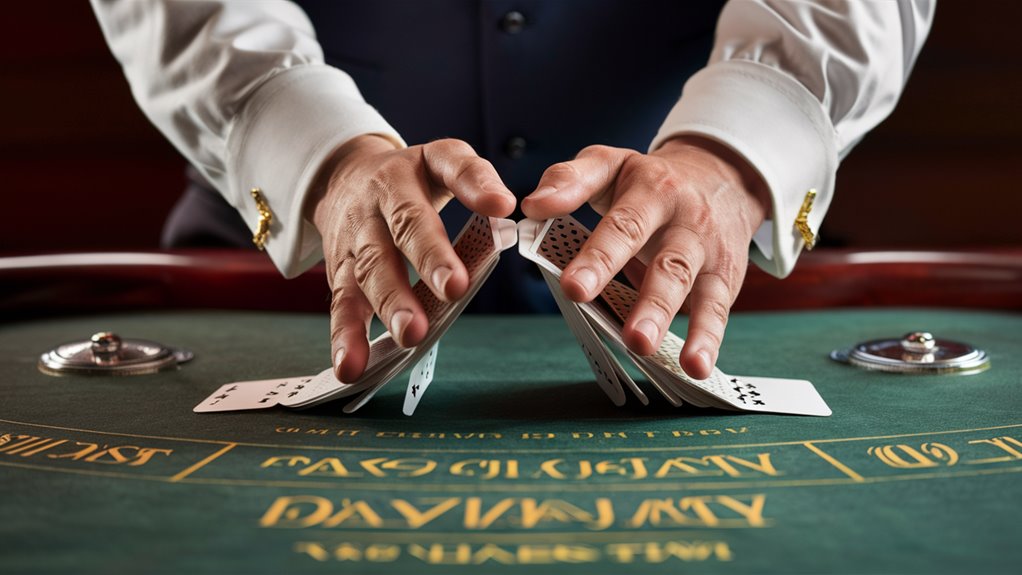
Mastering Casino Game Fundamentals: A Comprehensive Guide
Essential Gaming Foundations
Understanding fundamental game mechanics serves as the critical foundation for casino success.
Begin by thoroughly mastering basic rules, odds calculations, and payout structures for your selected games.
For blackjack strategy, focus on memorizing perfect basic strategy charts until decision-making becomes intuitive.
In poker fundamentals, prioritize hand rankings and position play before advancing.
Core Gaming Principles
Eliminating rookie mistakes marks the first step toward gaming proficiency. Essential guidelines include:
- Never split tens in blackjack strategy
- Avoid the tie bet in baccarat fundamentals
- Practice strict bankroll management
- Understand slot machine mechanics, including paylines and volatility
- Study return-to-player (RTP) percentages
Practice Methodology
Game mastery requires focused dedication to a single casino game initially.
Utilize free online platforms and low-stakes tables for risk-free practice. Maintain detailed records of:
- Dealer procedures
- Table betting limits
- Casino etiquette
- Win/loss patterns
- Areas requiring improvement
FAQs About Casino Game Fundamentals
Q: How long does it take to master basic casino game strategies?
A: Typically 2-4 weeks of consistent practice to develop fundamental proficiency.
Q: Which casino game offers the best odds for beginners?
A: Blackjack with basic strategy provides one of the lowest house edges at around 0.5%.
Q: Should i practice online before playing in physical casinos?
A: Yes, online practice allows risk-free learning of game mechanics and basic strategies.
Q: What’s the minimum bankroll needed to start playing casino games?
A: Recommend 20-30 times the minimum bet for adequate practice sessions.
Q: How important is understanding game mathematics?
A: Essential – mathematical comprehension directly impacts strategic decision-making and long-term success.
Reading Other Players
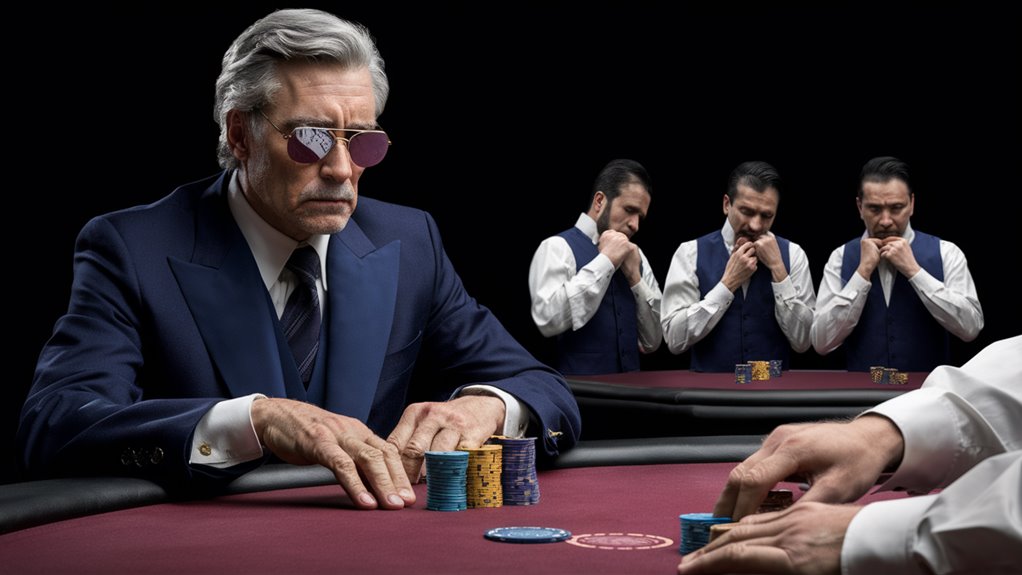
Mastering Player Psychology in Poker: A Professional Guide
Understanding Physical Tells and Behavioral Patterns
Professional poker analysis requires mastering the art of reading physical and behavioral indicators.
At high-stakes tables, micro-expressions, breathing patterns, and betting rhythms serve as crucial indicators of opponents’ hand strength and confidence levels. These subtle cues often reveal more than players intend to share.
Advanced Physical Tell Analysis
Chip handling and card management provide valuable insights into player psychology.
Trembling hands typically indicate nervousness or excitement, while measured movements suggest either genuine confidence or attempted deception.
Timing patterns – particularly the duration between action and decision – often correlate strongly with hand strength.
Verbal and Behavioral Indicators
Voice modulation, forced social interaction, and unusual conversation patterns function as key psychological indicators during gameplay.
Changes in verbal behavior frequently signal stress responses or strategic misdirection.
Betting pattern analysis reveals critical deviations from established player tendencies, particularly when standard betting frequencies or amounts shift unexpectedly.
Frequently Asked Questions
Q: What’re the most reliable physical tells in poker?
A: Breathing patterns, chip handling consistency, and timing tells typically provide the most reliable physical indicators.
Q: How can I identify fake tells?
A: Look for inconsistencies between multiple indicators and compare current behavior against established patterns.
Q: Does online poker require different tell-reading skills?
A: Yes, online play focuses more on betting patterns, timing tells, and chat behavior analysis.
Q: What role does baseline behavior play in tell reading?
A: Establishing a player’s baseline behavior is crucial for identifying meaningful deviations during hands.
Q: How can I improve my tell-reading abilities?
A: Practice focused observation, maintain detailed player notes, and study consistent patterns across multiple sessions.
Developing Mental Resilience

Building Mental Resilience in Professional Poker
Understanding Mental Fortitude in High-Stakes Play
Mental resilience stands as the crucial differentiator between elite poker professionals and amateur players during high-pressure situations.
Through extensive observation, I’ve witnessed technically proficient players falter not due to skill deficiency, but rather their underdeveloped psychological endurance in casino gaming environments.
Core Strategies for Developing Mental Toughness
Implementing Loss Management Systems
Professional bankroll management begins with accepting losses as inherent components of the game. I establish and maintain strict loss limits with unwavering discipline.
When facing downswings, avoiding loss-chasing behavior becomes paramount?this common pitfall devastates both financial resources and psychological capital.
Mindfulness and Focus Enhancement
Advanced concentration techniques prove essential during extended poker sessions. Incorporating systematic breathing exercises between hands maintains optimal decision-making capabilities under pressure.
Elite players recognize that opponents actively seek signs of emotional compromise, making emotional regulation a critical skill.
Performance Optimization Methods
Maintaining a consistent playing routine regardless of results creates psychological stability.
I implement detailed performance tracking through comprehensive journaling, identifying specific triggers that impact strategic decisions.
This methodical approach develops the mental fortitude necessary for sustained high-level performance.
Frequently Asked Questions
Q: How long does it take to develop poker mental resilience?
A: Building robust mental resilience typically requires 6-12 months of dedicated practice and implementation of structured psychological techniques.
Q: What’re the key indicators of strong mental game?
A: Primary indicators include consistent decision-making under pressure, emotional stability during losses, and maintained focus during extended sessions.
Q: How can I prevent tilting during crucial hands?
A: Implement pre-established breathing techniques, maintain strict adherence to bankroll limits, and utilize strategic breaks during challenging sessions.
Q: What role does sleep play in mental resilience?
A: Adequate sleep significantly impacts decision-making capability and emotional regulation during high-stakes play.
Q: How do professional players maintain focus during multi-day tournaments?
A: Through structured rest periods, proper nutrition, and consistent application of mindfulness techniques between sessions.
Advanced Betting Techniques
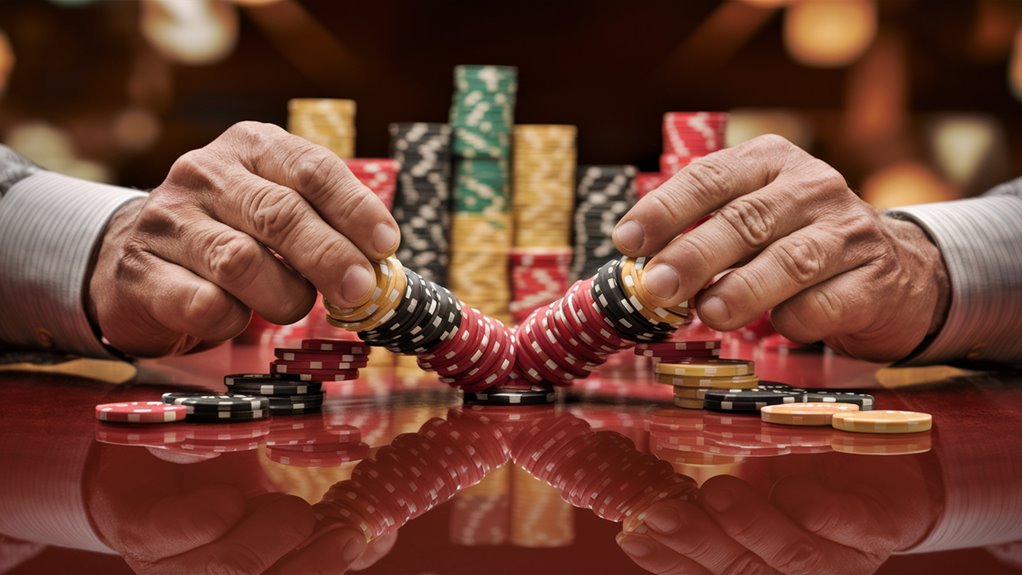
Advanced Poker Betting Strategies: A Complete Guide
Mastering Value Betting Fundamentals
Value betting represents the cornerstone of profitable poker play.
I implement a structured approach focusing on pot-sized betting ratios between 60-75% when holding premium hands against passive opponents.
This optimal betting range maximizes expected value while keeping opponents involved with marginal holdings.
Advanced Range Betting Concepts
Range-based betting requires constructing balanced betting patterns that represent both strong hands and strategic bluffs.
I utilize mixed frequencies and carefully selected sizing to maintain unpredictability.
This advanced technique prevents opponents from exploiting predictable patterns while maximizing profitability across different board textures.
Position-Based Betting Optimization
Position advantage dictates optimal bet sizing strategies:
- Late position: 40-50% pot bets maintain control while building value
- Early position: 70-85% pot bets protect equity and deny drawing odds
- Button plays: Mixed sizing approach based on opponent tendencies
Implementing Dynamic Betting Patterns
Timing variations and randomized sizing create exploitation-resistant strategies. I incorporate:
- Multi-street planning
- Board texture 먹튀검증커뮤니티 analysis
- Opponent-specific adjustments
- Stack depth considerations
Frequently Asked Questions
Q: What’s the optimal bet size for value betting?
A: The ideal value bet typically ranges from 60-75% of the pot against calling stations, adjusted based on opponent tendencies.
Q: How should betting patterns change in position?
A: Late position allows smaller bets (40-50% pot) for pot control, while early position requires larger bets (70-85% pot) for hand protection.
Q: What factors influence range betting decisions?
A: Board texture, opponent tendencies, stack depths, and previous action patterns all impact range betting strategy.
Q: How can I prevent my betting patterns from becoming predictable?
A: Vary timing and sizing while maintaining balanced ranges across different board textures and positions.
Q: What’s the most important aspect of advanced betting strategy?
A: Understanding the interaction between position, hand strength, and opponent tendencies to create profitable betting patterns.
Moving to High Stakes

Moving to Higher Stakes in Poker: A Strategic Guide
Essential Foundations for Moving Up
Building a successful transition to higher stakes poker requires three fundamental pillars.
First, maintain a properly sized bankroll of at least 50 buy-ins for your target stake level. This bankroll management strategy protects against variance and downswings while preserving long-term sustainability.
Proven Track Record Requirements
Tracking performance metrics is crucial before advancing stakes. i recommend documenting:
- Minimum 100 hours or 10,000 hands at current stakes
- Consistent win rate of 5+ big bets per hour
- Detailed statistics on key performance indicators
- Clear demonstration of strategic competence
Psychological Preparation
Mental game mastery becomes increasingly critical at higher stakes.
Larger monetary swings demand enhanced emotional control and decision-making capabilities under pressure.
Strategic shot-taking during peak performance periods helps evaluate readiness while maintaining the option to move down if necessary.
Progressive Advancement Strategy
Professional bankroll management involves:
- Gradual stakes progression
- Regular performance evaluation
- Conservative bankroll protection
- Experience accumulation at each level
#
Frequently Asked Questions
Q: What’s the minimum bankroll needed for moving up?
A: Maintain at least 50 buy-ins for your target stake level.
Q: How long should i track results before moving up?
A: Track minimum 100 hours or 10,000 hands with proven profitability.
Q: What win rate indicates readiness for higher stakes?
A: Aim for at least 5 big bets per hour at current stakes.
Q: When should i move back down in stakes?
A: Move down if experiencing consistent losses or psychological pressure affecting performance.
Q: How long does it typically take to reach high stakes?
A: Reaching high stakes often requires several years of consistent progression and proven results.
Common Questions
How Long Does It Take for a Casino to Process Withdrawal Requests?
Casino Withdrawal Processing Times: A Complete Guide
Based on extensive research and industry experience, casino withdrawal processing times typically range from 24-72 hours, though specific timeframes vary by payment method and casino operator.
Standard Processing Times by Payment Method
E-Wallets (24-48 hours)
- PayPal: 24-48 hours
- Skrill: 24 hours
- Neteller: 24 hours
Bank Transfers (3-7 business days)
- Wire transfers: 3-5 business days
- ACH transfers: 3-7 business days
- Direct bank deposits: 2-4 business days
Credit/Debit Cards (2-5 business days)
- Visa: 2-5 business days
- Mastercard: 2-5 business days
Traditional Methods (5-10 business days)
- Paper checks: 7-10 business days
- Bank drafts: 5-7 business days
Factors Affecting Withdrawal Speed
- Account verification status
- Withdrawal amount
- Casino’s processing department hours
- Payment method restrictions
- Regional banking regulations
Frequently Asked Questions
Q: What is the fastest casino withdrawal method?
A: E-wallets like PayPal, Skrill, and Neteller typically offer the fastest withdrawal times, usually within 24 hours.
Q: Why do some withdrawals take longer than others?
A: Processing times vary due to verification requirements, payment method limitations, and banking regulations.
Q: Are weekend withdrawals processed slower?
A: Yes, most casinos process withdrawals only during business days, leading to longer weekend processing times.
Q: Can I speed up my withdrawal processing?
A: Complete account verification early and choose fast payment methods like e-wallets for quicker processing.
Q: What’s the minimum withdrawal amount at most casinos?
A: Minimum withdrawal amounts typically range from $10 to $50, varying by casino and payment method.
What Loyalty Programs Offer the Best Rewards for Regular Players?
Best Casino Loyalty Programs and Rewards for Regular Players
Top-Tier Casino Loyalty Programs
Casino loyalty programs offer substantial value for frequent players through comp points, exclusive bonuses, and VIP perks. Understanding which programs deliver the best returns helps maximize gaming benefits.
Elite Status Benefits
- Free hotel stays
- Priority restaurant reservations
- Exclusive tournament invitations
- Personal host service
- Enhanced comp point multipliers
Most Rewarding Programs
MGM Rewards stands out with its multi-tier system offering:
- 4% – 20% cashback on play
- Room upgrades
- Priority service
- Airport lounge access
Caesars Rewards delivers:
- Up to 25% bonus on earned credits
- No resort fees
- Celebration dinners
- Diamond lounge access
Maximizing Loyalty Program Value
Point Accumulation Strategy
- Focus spending on single program
- Track promotional periods
- Utilize point multiplier events
- Combine gaming and non-gaming spend
Program Selection Criteria
- Geographic coverage
- Point expiration policies
- Redemption flexibility
- Tier achievement requirements
FAQ
Q: How quickly do loyalty points expire?
A: Most programs maintain points for 6-12 months of account activity.
Q: Can points be transferred between programs?
A: Select programs offer status matching but rarely allow point transfers.
Q: What’s the fastest way to earn elite status?
A: Concentrated play during bonus periods and utilizing status match opportunities.
Q: Are online casino rewards comparable to land-based programs?
A: Online programs typically offer higher cashback but fewer lifestyle perks.
Q: Do loyalty points work the same for all games?
A: Point earning rates vary by game type, with slots typically earning the highest rates.
Can Casino Skills Learned Online Transfer Effectively to Physical Casino Environments?
Transferring Online Casino Skills to Physical Casino Environments
Online casino skills largely transfer effectively to physical casino environments, though players must adapt to key differences. Game strategies, probability calculations, and bankroll management techniques learned online provide a solid foundation for live casino success.
Core Skills That Transfer Successfully
Mathematical principles and basic game strategies remain consistent across both environments. Players who master:
- Blackjack card counting
- Poker hand rankings
- Betting patterns
- Probability calculations
will find these skills equally valuable in physical casinos.
Necessary Adjustments for Live Play
Physical casino environments require additional adaptations:
- Face-to-face dealer interactions
- Different betting timeframes
- Physical chip handling
- Table etiquette
- Casino atmosphere management
Frequently Asked Questions
Q: Do online poker skills transfer to live poker rooms?
A: Yes, strategic and mathematical skills transfer well, but players must adjust to physical tells and live player dynamics.
Q: Can I use the same betting strategies in physical casinos?
A: Yes, though betting patterns may need modification due to different table minimums and maximums.
Q: How different is the pace between online and physical play?
A: Physical casinos typically operate at a slower pace, with fewer hands per hour compared to online play.
Q: Will my bankroll management skills transfer directly?
A: Yes, though physical casinos may require larger bankrolls due to higher minimum bets.
Q: Are card counting skills from online practice effective in physical casinos?
A: Yes, though players must adapt to manual counting and casino countermeasures.
Are There Specific Peak Hours When Casinos Offer Better Odds?
Casino Odds and Peak Hours: A Comprehensive Analysis
Understanding Casino Game Odds
Casino odds remain mathematically constant regardless of the time of day or night. The programmed house edge in slot machines and the inherent statistical advantages in table games maintain their fixed percentages throughout operating hours. This fundamental principle ensures consistent casino operations and regulatory compliance.
Peak vs. Off-Peak Hours Gaming Experience
Advantages of Off-Peak Hours
- Less crowded gaming floors
- More personalized dealer attention
- Relaxed atmosphere
- Easier table access
- Minimal waiting times
Strategic Benefits During Quieter Periods
Playing during off-peak hours (typically weekday mornings and early afternoons) offers practical advantages beyond odds. Players can benefit from:
- Enhanced learning opportunities
- Lower minimum bet requirements
- More time to consider decisions
- Reduced ambient noise and distractions
## Frequently Asked Questions
Q: Do casinos change their odds at different times?
A: No, casino odds remain constant regardless of time. Gaming regulations require consistent odds.
Q: When are casino off-peak hours?
A: Typically Monday through Thursday, from opening until 3 PM.
Q: Are slot machines looser during certain hours?
A: No, slot machine payout percentages are programmed and remain fixed.
Q: Is it better to gamble during quiet periods?
A: While odds don’t change, quieter periods offer more comfortable playing conditions.
Q: Do special events affect casino odds?
A: No, odds remain the same during special events and peak periods.
Should Players Tip Dealers Even When Losing Consistently at the Table?
Tipping Casino Dealers: Best Practices When Losing
Understanding Dealer Tipping Etiquette
Professional casino dealers rely partially on tips as part of their income, similar to other service industry workers. The standard practice is to maintain consistent tipping regardless of winning or losing streaks. A recommended baseline tip of $5 per hour of play helps support dealers who facilitate the gaming experience.
Why Tip During Losses?
Dealers provide valuable services throughout gaming sessions:
- Managing game flow and maintaining order
- Ensuring fair play and rule compliance
- Creating an engaging atmosphere
- Offering guidance on basic game procedures
- Handling chips and cards professionally
Best Tipping Practices
Strategic tipping approaches include:
- Setting aside a dedicated tipping budget before playing
- Maintaining a consistent $5 per hour rate
- Tipping smaller amounts more frequently versus larger occasional tips
- Adjusting tips based on table minimums and stakes
- Considering extra tips for exceptional service
Common Questions About Dealer Tipping
Q: Should I tip less when losing?
No, dealers’ service remains constant regardless of player outcomes.
Q: How much should I budget for tips?
Allocate 1-2% of your total gambling budget for dealer tips.
Q: When is the best time to tip?
Regular small tips throughout the session are preferred over end-of-session tipping.
Q: Should I tip more at high-stakes tables?
Yes, consider increasing tips proportionally with higher table minimums.
Q: Do all casino games warrant the same tipping rate?
Adjust tipping based on game complexity and dealer involvement level.
Maintaining Professional Relationships
Building positive dealer rapport through consistent tipping enhances the overall gaming experience and reflects well on players, regardless of winning or losing outcomes. This practice helps ensure quality service and maintains casino etiquette standards.






